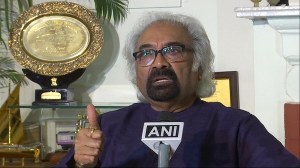- India
- International
Simply put: Understanding issues of illegal migration in new Citizenship Bill
At the heart of ongoing protests in Assam are ways in which the Bill seeks to extend special facilities to 6 religious groups from 3 neighbouring countries.
 A protest against the Citizenship Amendment Bill in Assam last week. (Source: PTI)
A protest against the Citizenship Amendment Bill in Assam last week. (Source: PTI)
Several groups in Assam, including the All Assam Students’ Union and BJP ally Asom Gana Parishad, have been protesting against the Citizenship (Amendment) Bill, 2016, which seeks to make foreign illegal migrants from some minority communities eligible for Indian citizenship. According to the Assam Accord of 1985, illegal migrants who had entered Assam from Bangladesh after March 25, 1971, were to be detected and deported. The protesting groups argue that the Bill contradicts the terms of the Accord. The Bill, which was introduced in Lok Sabha on July 19, is now before a Joint Parliamentary Committee, which is expected to submit its report in Parliament’s Winter Session.
Watch what else is making news:
So, who are illegal migrants, and how does the law treat them?
A foreigner is considered to be an illegal migrant under two circumstances. One, if they come into India without valid travel documents, like a visa and passport, or two, having come in legally, they stay beyond the time period permitted to them under their travel documents. Illegal migrants may be imprisoned or deported. They and their children are ineligible for Indian citizenship under the Citizenship Act of 1955.
However, certain benefits have been granted to some groups of illegal migrants. In September 2015 and July 2016, the central government exempted certain groups of illegal migrants from being imprisoned or deported. These are illegal migrants who came into India from Afghanistan, Bangladesh or Pakistan on or before December 31, 2014, and belong to the Hindu, Sikh, Buddhist, Jain, Parsi or Christian religious communities. Illegal migrants from this group cannot be imprisoned or deported for not having valid travel documents.
How many illegal migrants are there in the country?
There are no official estimates — mainly because of the difficulty in tracking persons who have entered the country without the requisite papers. The only kind of data that is available is regarding the number of foreigners who, having entered India legally, have stayed back illegally. Official estimates put this number at 28,356 as of December 2014. The largest number among these illegal migrants are from Pakistan (15%), followed by Sri Lanka (14%), South Korea (6%) and Iraq (6%).

How does the new Bill seek to change the law on illegal migrants?
At present, a person can apply for Indian citizenship on grounds including being born in India, or to an Indian parent, or having resided in India over a certain period of time. However, an illegal migrant is prohibited from becoming an Indian citizen. The amendment Bill provides that illegal migrants belonging to the specified six minority communities from Afghanistan, Bangladesh or Pakistan will not be treated as illegal migrants and will, therefore, be eligible for Indian citizenship.
The Bill also relaxes the eligibility criteria for citizenship for persons from these six minority communities of the three neighbouring countries. As of now, a person must have resided in India for 12 of the 15 years preceding the date of application; the Bill relaxes the 12-year requirement to 7 years for this particular group of individuals.
Is the Bill differentiating among illegal migrants based on religion?
The Bill does not cover illegal migrants who are Muslim, or who belong to other minority communities such as Jews and Bahais from Afghanistan, Bangladesh and Pakistan. This provision will have to be evaluated against the standard of equality guaranteed to all citizens and foreigners under Article 14 of the Constitution. Article 14 only allows laws to treat groups of people differently if there is a reasonable rationale for doing so. The government has not provided any clear rationale for making illegal migrants belonging to only some minority communities eligible for citizenship.
What are the other key aspects of the Bill?
The Bill also affects Overseas Citizen of India (OCI) cardholders. OCI cardholders are foreigners who are persons of Indian origin. For example, they may have been former Indian citizens, or children of current Indian citizens. An OCI enjoys benefits compared to other foreigners, such as the right to travel to India without a visa, or to work and study here.
At present, the government may cancel a person’s OCI registration on various grounds. In case of a cancellation, an OCI residing in India may be required to leave the country. The Bill seeks to add another ground for cancelling OCI registration — violation of any law in force in the country. This provides wide discretion to the government to cancel OCI registrations for both major offences like murder, as well as minor offences like parking in a no-parking zone or jumping a red light.
More Explained
EXPRESS OPINION
Apr 24: Latest News
- 01
- 02
- 03
- 04
- 05









































